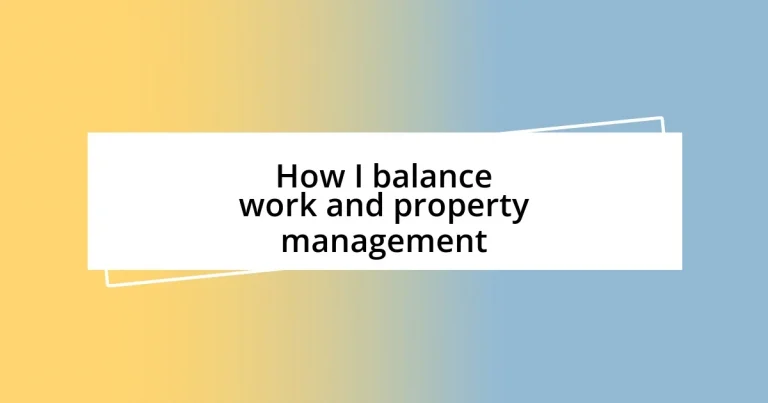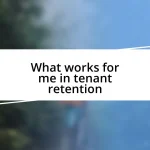Key takeaways:
- Establishing work-life balance requires setting boundaries and prioritizing self-care to avoid burnout and maintain emotional well-being.
- Effective property management involves defining roles, prioritizing tasks, and utilizing tools for organization and communication to ensure smooth operations.
- Delegating responsibilities fosters teamwork and trust, while maintaining clear communication and feedback loops enhances overall success and improvement.
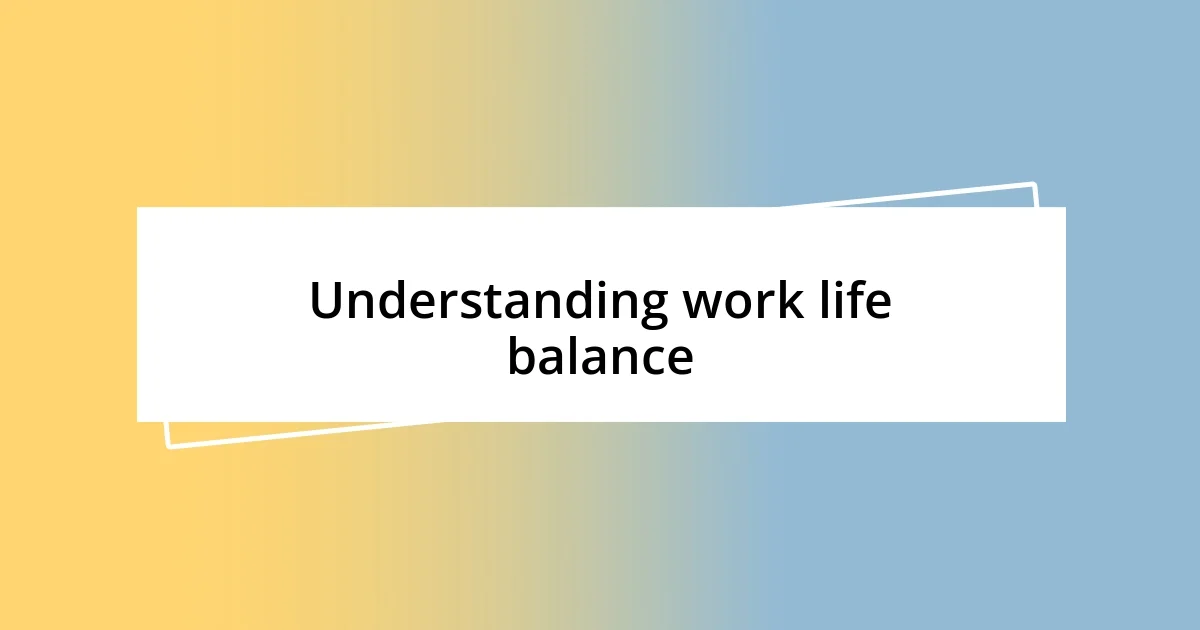
Understanding work life balance
Understanding work-life balance is crucial in today’s fast-paced world, especially when juggling responsibilities like property management. I remember a time when I was buried under a mountain of tasks—overseeing maintenance, dealing with tenant inquiries, and still trying to make time for family. It hit me then: I can’t pour from an empty cup. Isn’t it fascinating how we often forget to care for ourselves while caring for others?
In my experience, achieving that balance often requires setting clear boundaries. There were weekends when I’d check emails before breakfast, only to realize I missed family moments that could never be recaptured. It begs the question: what sacrifices are we willing to make in the name of ‘being busy’? Understanding that work will always be there, but quality time with loved ones is fleeting, reshaped my priorities.
Ultimately, work-life balance is deeply personal. For me, it’s about crafting a routine that nurtures both my professional drive and my emotional well-being. I began to schedule “me time” in my calendar, treating it as non-negotiable. Have you ever considered how much a small commitment to yourself can impact your overall happiness? It makes all the difference.
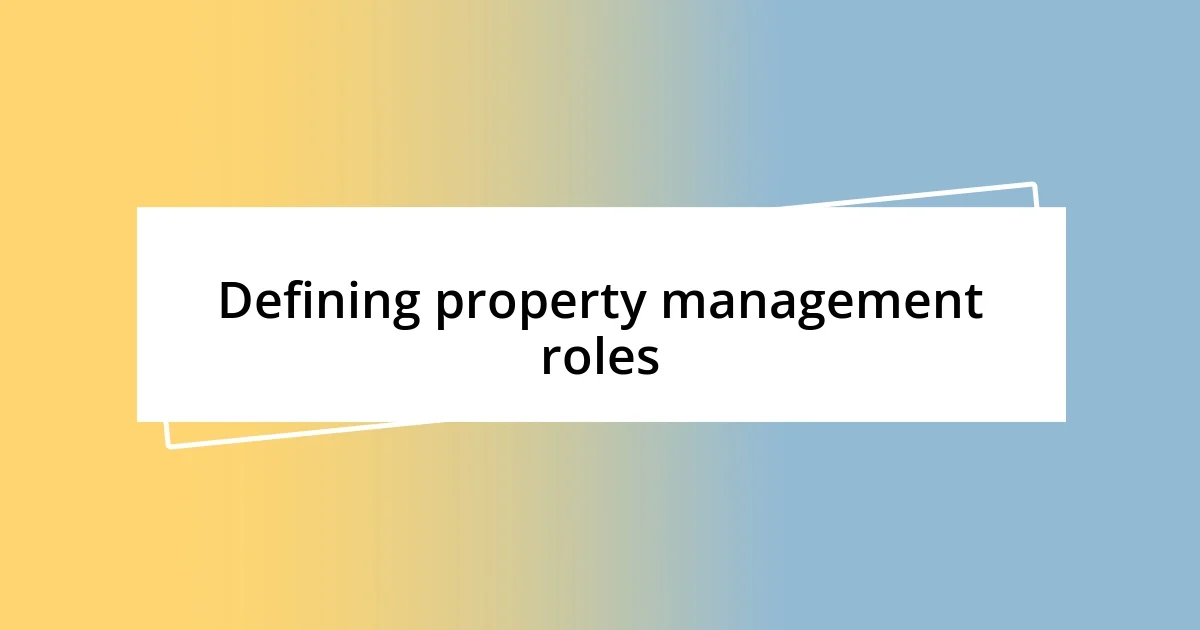
Defining property management roles
Property management encompasses a variety of roles, each essential for ensuring a seamless operation. From my own experience, I’ve often found myself acting as a mediator between tenants and landlords. This dual role can be tough—balancing their needs requires empathy and clear communication. Have you ever been in a situation where you’ve had to walk a tightrope between two conflicting parties? It’s not easy, but it’s rewarding when you find a solution that satisfies everyone.
In addition to mediation, a property manager must also handle various administrative tasks. Organizing paperwork, tracking rental payments, and keeping records can feel overwhelming at times. I once spent an entire weekend sorting through years of outdated files in a storage room. While it was tedious, that process uncovered some hidden gems—like lease agreements I didn’t realize were still active. It’s moments like these that remind me how vital thorough record-keeping is. How often do we overlook the importance of staying organized when we’re in the thick of things?
Ultimately, defining these roles is essential for achieving success in property management. Each task, whether it’s maintenance coordination or tenant relations, contributes to a larger framework that keeps everything running smoothly. I remember a particularly hectic week when an HVAC system failed just as a new tenant moved in. With quick thinking and teamwork, we resolved the issue within hours, turning a potential crisis into a demonstration of our capability. Isn’t it fulfilling when everything comes together, even amidst the chaos?
| Role | Description |
|---|---|
| Tenant Liaison | It involves addressing tenant concerns and fostering good relationships. |
| Administrative Coordinator | This role focuses on documentation, file management, and tracking payments. |
| Maintenance Manager | Overseeing repair requests and ensuring property upkeep are key tasks here. |
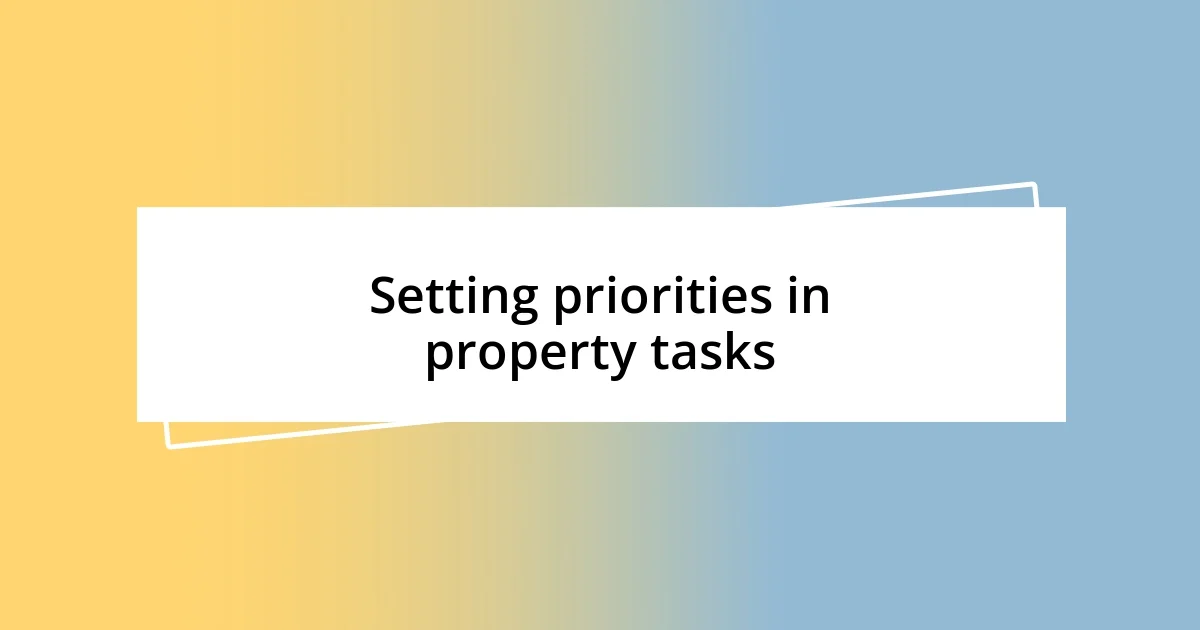
Setting priorities in property tasks
When it comes to property management, setting priorities can often feel like a balancing act. I can recall a particularly hectic month when I was swamped with urgent repairs while trying to finalize leases. In that situation, prioritizing tasks became crucial. I learned quickly that not all tasks carry the same weight. By identifying immediate concerns—like a leaking roof versus a tenant’s request for a paint job—I was able to allocate my time and resources more efficiently. It’s during these high-pressure moments that I’ve realized the importance of clear priorities.
Here are some strategies I’ve found effective in prioritizing property tasks:
- Assess Urgency: Determine what needs immediate attention versus what can wait.
- Evaluate Impact: Consider how a task affects tenants and overall property value.
- Time Management: Use tools like calendars or to-do lists to schedule your priorities clearly.
- Delegate When Possible: Don’t hesitate to assign less critical tasks to others, freeing you to focus on high-stakes issues.
- Stay Flexible: Be ready to reassess priorities if unexpected issues arise.
In the relentless world of property management, these strategies have helped me stay grounded, ensuring I don’t get lost in a sea of tasks.
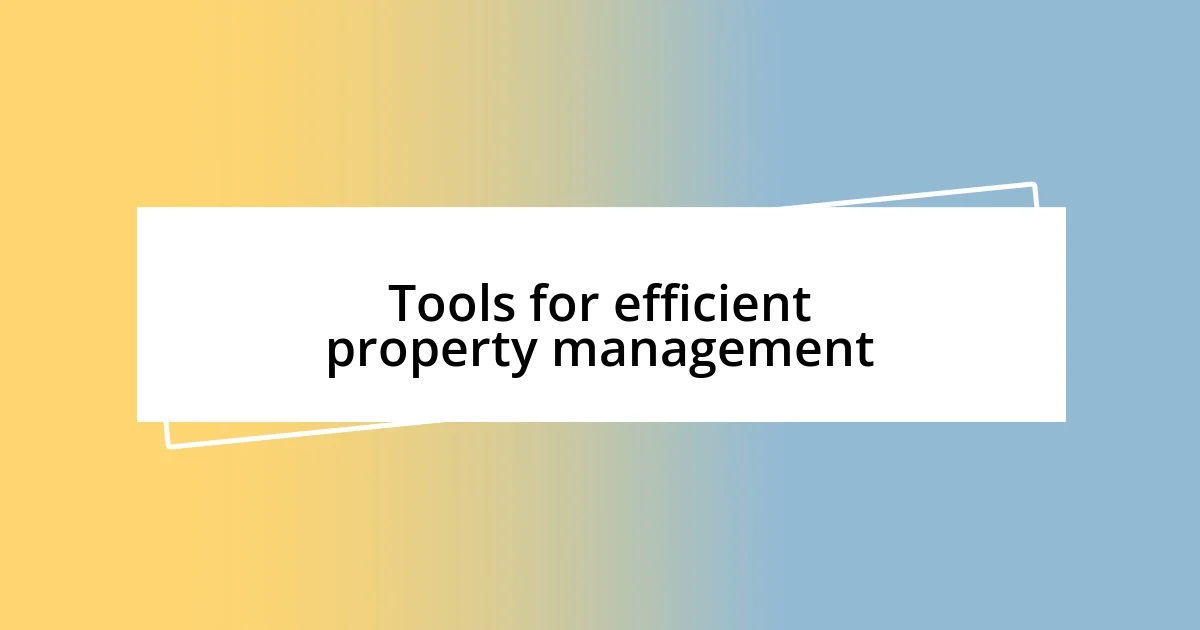
Tools for efficient property management
Efficient property management hinges on using the right tools to simplify tasks. For instance, I’ve relied heavily on property management software like Buildium and AppFolio. The first time I used Buildium to automate rent collection, it felt like a weight lifted off my shoulders. Have you ever had those late-night moments worrying about overdue payments? With software like this, those sleepless nights can become a thing of the past.
I’ve found that communication tools like Slack or Microsoft Teams are game-changers. They enable me to maintain open lines with contractors and tenants alike, streamlining updates and resolving disputes swiftly. I remember a frantic morning when a plumbing issue arose in one of my properties; thanks to a quick message sent via Slack, we had a plumber on-site within the hour. Doesn’t it feel incredible when technology allows us to respond instantly to challenges?
Lastly, a robust maintenance tracking app has transformed how I manage repairs and requests. By documenting issues systematically, I can stay organized and proactively schedule necessary follow-ups. I once had a tenant report a heating issue late on a Friday evening. Utilizing my maintenance app, I not only logged the request but also scheduled an inspection for first thing Monday. The tenant appreciated the prompt action, and I couldn’t help but feel a sense of accomplishment. How fulfilling is it to know you’re providing not just a service, but peace of mind?
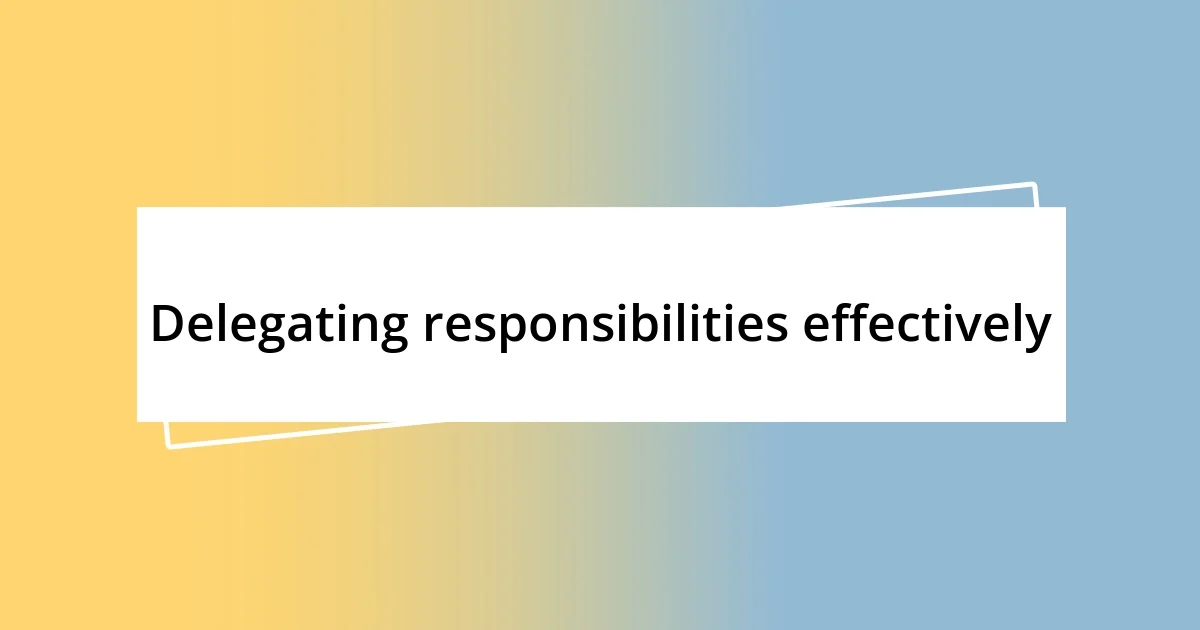
Delegating responsibilities effectively
When it comes to delegating responsibilities, I’ve discovered that trust is key. Early in my property management journey, I hesitated to assign tasks to my team, fearing that things wouldn’t get done right. However, after a particularly overwhelming week filled with tenant issues, I decided it was time to delegate the routine tasks of answering maintenance calls. Not only did this lighten my load, but it also empowered my team, making them feel valued and responsible. Have you ever experienced that moment when you realize delegation isn’t just about offloading work, but fostering a sense of teamwork?
Clear communication is another vital aspect of effective delegation. I’ve found that laying out expectations directly can save a lot of time and confusion. For example, when assigning a landscaping project, I make it a point to provide details about what the end goal looks like. During one project, I remember telling my landscaper exactly how I envisioned the front yard—not just what plants I wanted but also how I pictured it complementing the building. This clarity turned an average yard into an inviting entrance, enhancing the property’s appeal. Isn’t it rewarding to see how well-defined roles can create such beautiful results?
Finally, I always ensure there’s a feedback loop in place after tasks are completed. I often check in with my team to discuss what worked and what didn’t. There was a time when a property manager I had hired missed a critical deadline. Instead of placing blame, we sat down to discuss what happened. This conversation opened up new ideas on how we could both manage timelines better and improve communication. It taught me that constructive feedback isn’t just about accountability; it’s a pathway to improvement and success. How many opportunities do we miss if we forget to look for lessons in our experiences?
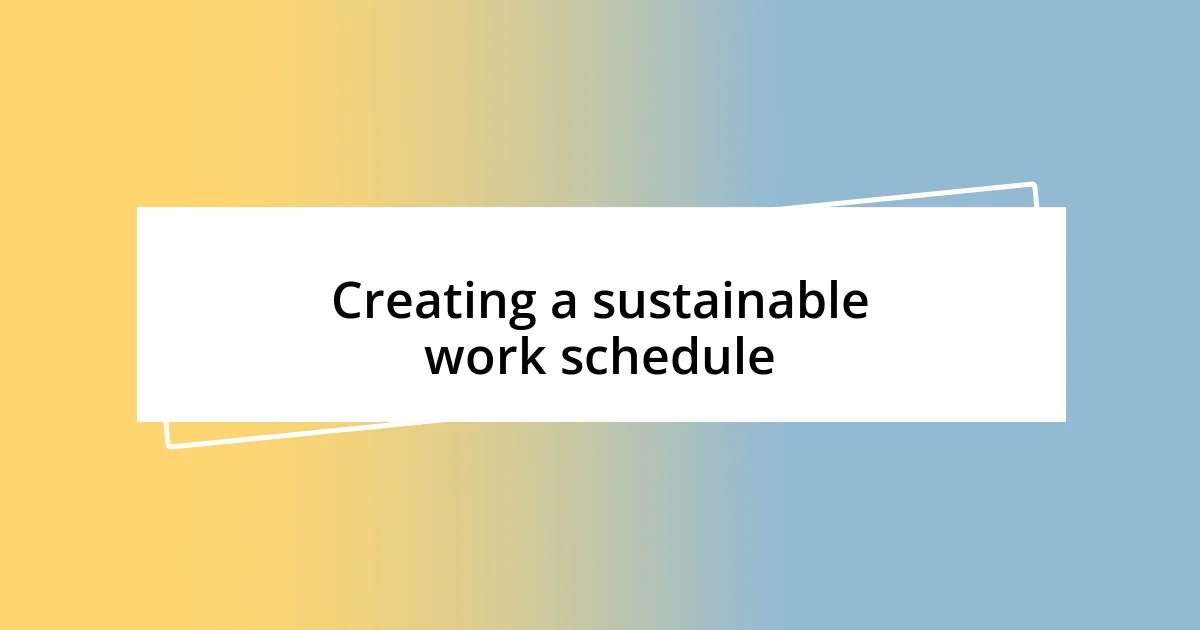
Creating a sustainable work schedule
Establishing a sustainable work schedule requires intentional planning and a good dose of self-awareness. I learned early on that a rigid schedule often led to burnout. Instead, I now block out my days with designated periods for property management tasks and personal time. Can you recall the exhaustion of trying to fit everything into a jam-packed day? Trust me, those days are behind me when I embraced a more relaxed approach.
One effective strategy I’ve implemented is the Pomodoro Technique, where I work in focused intervals with scheduled breaks. When I first tried it, I was amazed at how much I could accomplish without feeling drained. I remember a particularly hectic day filled with showing units and receiving calls from tenants; by breaking my tasks into manageable chunks, I found I was not only more productive but also more present in each interaction. Doesn’t it make a difference when you can give your full attention rather than rushing through?
Moreover, I can’t stress enough the importance of flexibility in my schedule. Life happens—pipes burst, tenant emergencies arise, and sometimes we just need a breather. Just last week, I had planned a full day of office work, but a last-minute tenant request shifted my focus. Instead of stressing about the change, I viewed it as an opportunity to engage and connect more personally with my tenants. Have you ever turned a spontaneous event into a positive experience? For me, adjusting my plans allowed me to build stronger relationships while still maintaining a sense of balance in my work life.












